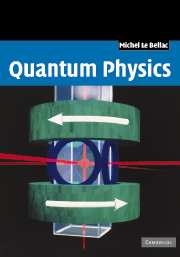Book contents
- Frontmatter
- Contents
- Foreword by Claude Cohen-Tannoudji
- Preface
- Table of units and physical constants
- 1 Introduction
- 2 The mathematics of quantum mechanics I: finite dimension
- 3 Polarization: photons and spin-1/2 particles
- 4 Postulates of quantum physics
- 5 Systems with a finite number of levels
- 6 Entangled states
- 7 Mathematics of quantum mechanics II: infinite dimension
- 8 Symmetries in quantum physics
- 9 Wave mechanics
- 10 Angular momentum
- 11 The harmonic oscillator
- 12 Elementary scattering theory
- 13 Identical particles
- 14 Atomic physics
- 15 Open quantum systems
- Appendix A The Wigner theorem and time reversal
- Appendix B Measurement and decoherence
- Appendix C The Wigner–Weisskopf method
- References
- Index
4 - Postulates of quantum physics
Published online by Cambridge University Press: 05 January 2013
- Frontmatter
- Contents
- Foreword by Claude Cohen-Tannoudji
- Preface
- Table of units and physical constants
- 1 Introduction
- 2 The mathematics of quantum mechanics I: finite dimension
- 3 Polarization: photons and spin-1/2 particles
- 4 Postulates of quantum physics
- 5 Systems with a finite number of levels
- 6 Entangled states
- 7 Mathematics of quantum mechanics II: infinite dimension
- 8 Symmetries in quantum physics
- 9 Wave mechanics
- 10 Angular momentum
- 11 The harmonic oscillator
- 12 Elementary scattering theory
- 13 Identical particles
- 14 Atomic physics
- 15 Open quantum systems
- Appendix A The Wigner theorem and time reversal
- Appendix B Measurement and decoherence
- Appendix C The Wigner–Weisskopf method
- References
- Index
Summary
In this chapter we shall present the basic postulates of quantum physics, generalizing the results obtained in the preceding chapter for the two special cases of photon polarization and spin 1/2. In general, the space of states will a priori have any dimension N, which may even be infinite, rather than only two dimensions. The postulates which we present in this chapter fix the general conceptual framework of quantum mechanics and do not directly provide the tools necessary for solving specific problems. The solution of a specific physical problem always involves a modeling stage, where the system to be studied is simplified, the approximations to be used are defined, and so on, and this modeling stage inevitably rests on more or less heuristic arguments which cannot be derived within the general framework of quantum physics. In Section 3.2.5 we gave an example of a heuristic procedure leading to the solution of a specific problem, that of the motion of a spin 1/2 in a magnetic field.
Other sets of postulates can be used. For example, another approach is to state the postulates of quantum mechanics in terms of path integrals. As is often the case, the same physical theory can be dressed in various different mathematical clothes. Finally, it should be emphasized that the postulates of quantum physics give rise to some difficult epistemological problems which are still largely under debate and which we do not discuss in this book. The interested reader may consult, for example, the book by Isham [1995].
- Type
- Chapter
- Information
- Quantum Physics , pp. 96 - 124Publisher: Cambridge University PressPrint publication year: 2006



